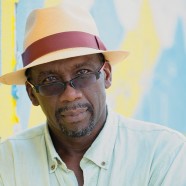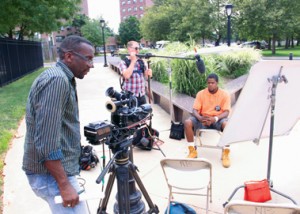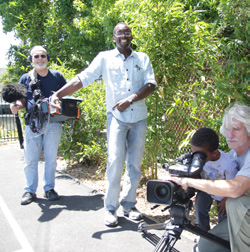
“I’m attracted to the consequences of big ideas shaping people’s lives,” says Llew Smith, summing up what drives his filmmaking. His film legacy over nearly 35 years shows a diligent historian, a fearless visual artist, a sensitive and ambitious chronicler of identity and experience in the United States. Llew is alternately, or sometimes simultaneously, a writer, director, producer, series editor and “especially rainmaker, if you know what I mean.” Llew “backed into filmmaking,” by seizing a number of serendipitous opportunities that cropped up in Minnesota, in the late ’70s, after his undergraduate days at Carleton College.
A tentative teenage conversation with his first girlfriend predicted the arc of Llew’s career and its challenges. He was 17 and the two had come around to projecting the future — what they hoped to “be.” Llew’s girlfriend laughed incredulously when he reflexively said, “I want to direct films.”
“I understood later that she was not really laughing at me, but more at the idea,” Llew says. “If I’d said I’m going to work at the post office, or as a teacher, or even a politician, she could see how that was possible. But a filmmaker? There were no black filmmakers we knew of in the 1970s.”
In fact, Llew did have to invent himself as a filmmaker. In the late ’70s, he was working on a master’s in communication at the University of Minnesota when Reginald Buckner, a legendary pianist and professor of music, approached him about creating a TV course on jazz; Llew leapt at the chance and they produced Jazz: An American Classic. On the strength of that, Llew says, he was able to “struggle my way into this business.” He was hired by WETA to write for a series called From Jump Street: The Story of Black Music, hosted by Oscar Brown Jr. The show presented an amazing range of American black music in live performances. “Everyone around me at that point knew about as much as I did about what they were doing,” Llew says.
Not until he joined the production team for the series Eyes on the Prize would he gain the mentoring of seasoned cinematographers. Arriving as an associate producer, Llew could observe how documentary storytelling takes shape as an entity that dictates its own tone and direction, and demands technical and aesthetic care. The eminent documentary team included Jon Else, Orlando Bagwell, Callie Crossley, and legendary executive producer Henry Hampton.
 “Filmmaking is so powerfully collaborative,” Llew says, “not just the technical work, but the process of discovering and defining the narrative itself. That happens not just within the film team, but also with experts who work with us to build the most compelling story. I depend on the historians, the social scientists, the economists, the sociologists and others to help us clarify our vision and test the veracity of the narrative we’re presenting. It can be a tough and humbling process.”
“Filmmaking is so powerfully collaborative,” Llew says, “not just the technical work, but the process of discovering and defining the narrative itself. That happens not just within the film team, but also with experts who work with us to build the most compelling story. I depend on the historians, the social scientists, the economists, the sociologists and others to help us clarify our vision and test the veracity of the narrative we’re presenting. It can be a tough and humbling process.”
“A successful film is rooted in the narrative,” Llew says, “Facts alone can’t create an inspiring story. A documentary is not a visualized lecture.” Often, experts have done publicly funded research in a field for years, he points out. While their work advances knowledge, their findings usually live in a peer-reviewed, nearly inaccessible world of professional journals and conferences. “I like to take important insights and translate those into a provocative public conversation.” he says. “If you help me understand your research, I can help make it more widely available through storytelling to national audiences — not ‘dumbing it down,’ but rather getting these ideas into the public imagination, where they can provoke change.”
The PBS series Unnatural Causes: Is Inequality Making Us Sick? (2008) is a case in point; Llew was co-executive director. In seven episodes, Unnatural Causes relies on individual stories to anchor a growing body of uncomfortable but important data. The first takes us to Louisville, Kentucky, where the lives of a CEO, a lab supervisor, a janitor, and an unemployed mother “show how class shapes opportunities for good health,” says the series’ description. “Those on the top have the most access to power, resources and opportunity — and thus the best health. Those on the bottom are faced with more stressors — unpaid bills, jobs that don’t pay enough, unsafe living conditions, exposure to environmental hazards, lack of control over work and schedule, worries over children — and the fewest resources available to help them cope.” The series showed that health outcomes (and their costs) are inexorably tied to social conditions that we create in our communities. It triggered a national discussion, especially in public health circles, that continues today.
The scholarly discourse supporting “the social determinants of health” was “about 100 years in the making,” Llew says. As he built the plan for this series, Llew was exactly where he liked to be: using powerful stories to illustrate a complex reality, and create a meaningful public dialogue.
Llew wants to share insights that may be new to people, and even alarming or unsettling, but so compelling and urgent that they don’t turn away; at the same time he aims at accuracy, so experts in the field are able to say, “this does represent our knowledge at this time.”
Each person comes to a film with a preformed idea of what that film is going to be about, Llew believes, and where it might go. He likes to “meet audience assumptions exactly where they are, and then do a jiujitsu number: flip it — turn those expectations on their head and land the viewer inside the story, with an emotional connection they didn’t expect.”
Gunnar Myrdal, the Swedish economist and Nobel laureate, is Llew’s agent for catapulting you into the center of his new film, American Denial. In 1938, the Carnegie Corporation chose Myrdal to conduct a five-year investigation of American life and values. They selected Myrdal because of his international status as a researcher and theorist, and as a non-national from a non-imperialist country. Myrdal was interested in America’s core longing for equality, contraposed with the reality of our racial inequality.
Moving freely throughout the South, for a time by himself and then with the assistance of scholar Ralph Bunche, Myrdal questioned hundreds of Americans. “I am a Swede,” he would say. “I’m new to your country. Who are black people? What are they like?”
 Answers — from people who lovingly espoused our public values — defined black Americans as second-class citizens, distinctly inferior. Was denial a critical psychological exercise, Myrdal wondered, that enabled Americans to avow certain beliefs and act in opposition to those beliefs every day?
Answers — from people who lovingly espoused our public values — defined black Americans as second-class citizens, distinctly inferior. Was denial a critical psychological exercise, Myrdal wondered, that enabled Americans to avow certain beliefs and act in opposition to those beliefs every day?
Overwhelmed by these findings from the country he so revered, Myrdal became profoundly depressed. He began to lose confidence in himself. His marriage with his confidante and professional counterpart, Ada, seemed on the verge of collapse. In personal crisis, he worried whether he had uncovered the same thing within himself that seemed deeply entwined in the American character.
Ultimately, Ada did help her husband complete his report for the Carnegie Corporation, An American Dilemma, and the film shows how its insights are as relevant now as when he completed his study in 1944.
Watching the film without feeling Gunnar Myrdal’s visceral pain is impossible. Witnessing his intellectual and personal struggle leads you to new and highly uncomfortable awareness about its source. Immersed as you find yourself in Myrdal’s story, you cannot avoid exploring the issues of racism and white supremacy that affected him, and those issues playing out today.
The important thing, Llew says, in a film like this, is that people recognize and deal with the discomfort of where they find themselves when the credits roll. “I’ve succeeded when a person engages in a conversation with himself about what he is now struggling to understand. If we avoid acknowledging what we see,” Llew asserts, we must understand ourselves as complicit in “the inequality and racist structures that continue to inhabit our democracy.”
As Llew says, “good storytelling, especially the detail in stories, reveals universality. It’s in the story details that we see ourselves and connect with the human condition; and the meaning of that human condition doesn’t change, no matter our individual backgrounds.”
— by Cathleen Everett
American Denial will be aired on PBS’s Independent Lens on February 23, 2015.



